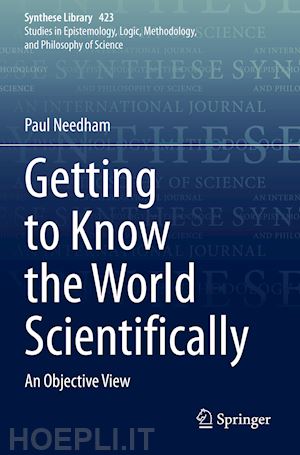
Questo prodotto usufruisce delle SPEDIZIONI GRATIS
selezionando l'opzione Corriere Veloce in fase di ordine.
Pagabile anche con Carta della cultura giovani e del merito, 18App Bonus Cultura e Carta del Docente
This undergraduate textbook introduces some fundamental issues in philosophy of science for students of philosophy and science students. The book is divided into two parts. Part 1 deals with knowledge and values. Chap. 1 presents the classical conception of knowledge as initiated by the ancient Greeks and elaborated during the development of science, introducing the central concepts of truth, belief and justification. Aspects of the quest for objectivity are taken up in the following two chapters. Moral issues are broached in Chap. 4, which discusses some aspects of the use and abuse of science, taking up the responsibilities of scientists in properly conducting their business and decision-makers in their concerns with the import of science for society. Part 2 contrasts the view of scientific progress as the rejecting of old hypotheses and theories and replacing them with new ones, represented by Karl Popper, with the conception of progress as accumulating knowledge, saving as much as possible from older theories, represented by Pierre Duhem. A concluding chapter defends the natural attitude of taking the theories of modern science to be literally true, i.e. realism, in the face of arguments drawn partly from the history of scientific progress in criticism of this stance.
Preface
Part I: Knowledge, Objectivity and Values
1. Knowledge1.1 Ideals deriving from the Greeks
1.2 What is knowledge?
1.3 Inductive support and proof
1.4 Looking forward
2. Objectivity
2.1 Introduction2.2 Observation and experiment
2.3 Objectivity of interpretation
2.4 Fallibility2.5 In the eyes of others
2.6 On the shoulders of others
2.7 Pressure: an example of progress in the articulation of a concept
2.8 Summary
3. Relativism
3.1 Vanquishing reason
3.2 Radical meaning change
3.3 Significant truth
3.4 Taking Stock
4. The Use and Abuse of Science
4.1 Introduction—The misuse of science
4.2 Abusing the right to declare “I know”
4.3 Fraud and controversy
4.4 Cooking
4.5 Masquerading as science
4.6 Science and responsibility
4.7 Error, risk and values
Part II: Philosophies of Science
5. Popper: Proving the Worth of Hypotheses
5.1 Popper’s two central problems
5.2 The problem of induction
5.3 Demarcation5.4 Falsifiability
5.5 Ad hoc hypotheses and scientific progress
5.6 Degree of falsifiability or induction by another name?
5.7 Verisimilitude
6. Duhem’s Continuity Thesis
6.1 Introduction
6.2 The not so dark middle ages
6.3 Duhem’s critique of the idea of a crucial experiment
6.4 Pushing the argument further
6.5 Precision
6.6 Reduction, unity and progress
7. Realism and the Advancement of Knowledge
7.1 Introduction
7.2 Superscientific inference
7.3 The vicissitudes of reference
7.3.1 Has “water” preserved its extension?
7.3.2 Has “atom” preserved its extension from Dalton’s time?
7.3.3 Are there remnants of reference of apparently abandoned terms?
7.4 Underdetermination
7.5 Taking stock
Bibliography
Index











Il sito utilizza cookie ed altri strumenti di tracciamento che raccolgono informazioni dal dispositivo dell’utente. Oltre ai cookie tecnici ed analitici aggregati, strettamente necessari per il funzionamento di questo sito web, previo consenso dell’utente possono essere installati cookie di profilazione e marketing e cookie dei social media. Cliccando su “Accetto tutti i cookie” saranno attivate tutte le categorie di cookie. Per accettare solo deterninate categorie di cookie, cliccare invece su “Impostazioni cookie”. Chiudendo il banner o continuando a navigare saranno installati solo cookie tecnici. Per maggiori dettagli, consultare la Cookie Policy.